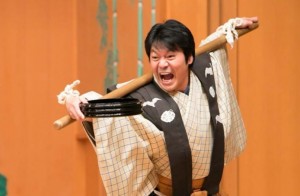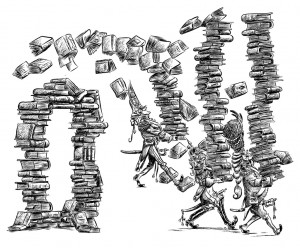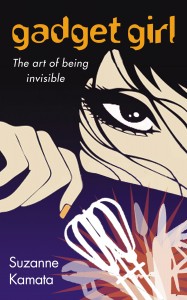TED JETs: Roland Kelts on “The Core of Cool Japan: Sustainability vs. Stagnation”
Posted by Tom Baker
JETs tend to be interesting people. After all, every one of them has relocated to a different country at least once. It’s not surprising that many of them have also had other interesting experiences, some of which lead to insights that they end up sharing in TED talks.
This is part of an occasional series on current or former JETs who have given TED talks. Here is JET alum Roland Kelts speaking about “The Core of Cool Japan: Sustainability vs. Stagnation.”
JQ Magazine: Book Review — ‘Monkey Business Volume 6’
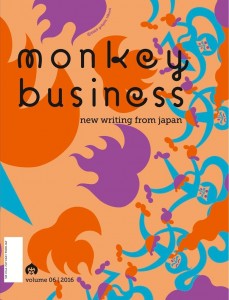
“In addition to the stories profiled here, there are other works that will make you laugh while taking you to a Japan that might not have even existed in your imagination.” (A Public Space)
By Rashaad Jorden (Yamagata-ken, 2008-10) for JQ magazine. A former head of the JETAA Philadelphia Sub-Chapter, Rashaad is a graduate of Leeds Beckett University with a master’s degree in responsible tourism management. For more on his life abroad and enthusiasm for taiko drumming, visit his blog at www.gettingpounded.wordpress.com.
Upon picking up the sixth volume of Monkey Business: New Writing from Japan, the first thought that popped into my head was that I would be introduced to epic Japanese works and/or more prominent authors from the country. After all, several award-winning writers—including Mieko Kawakami, Satoshi Kitamura and Hiroko Oyamada—produce works that appear in this volume. Quite possibly, some of the stories in this 21-piece set might become classics in Japanese literature. Or at the very least, this newbie to the Monkey Business series might discover new aspects of Japan—or be reintroduced to certain things—in rather unforgettable tales.
And well…this edition of Monkey Business doesn’t lack colorful stories. Several of them stand out, including the first one – “Forbidden Diary.” No, it doesn’t serve as an educational tour of Japanese history or culture. Instead, this excerpt of Sachiko Kishimoto’s fictional diary introduces us to a “Phantom Old Man” who has experienced Japan a little differently from the way you might have.
Let’s see…the old man (who is actually being taken care of by the narrator) remembers Shibuya as being totally void of people, as only a haven for rice paddies and without its iconic scramble crossroads. In addition to seemingly arriving out of the Stone Age, the old man repeatedly changes appearances during the story.
Justin’s Japan: Nippon in New York — Nippon in New York: Musicals, origami, the GazettE, Keiko Matsui, Sakura Matsuri
By JQ magazine editor Justin Tedaldi (CIR Kobe-shi, 2001-02) for Examiner.com. Visit his Japanese culture page here for related stories.
Spring has sprung in the Big Apple, and that means one thing: a new season of sounds, colors, and spectacular performing arts to match the blossoming sakura trees throughout the city.
This month’s highlights include:
Friday, April 1, 7:00 p.m.
Leonard Nimoy Thalia at Symphony Space, 2537 Broadway
$30 advance, $25 seniors, $35 day of show
Shunzo Ohno, one of the most versatile and influential trumpeters in modern jazz, returns with ReNew, his 16th album as a leader. ReNew injects elements of traditional jazz, hip-hop, spoken word, and free jazz, creating a tapestry of modern jazz that is distinctly his own. With “recovery to discovery” in mind, the genre-defying album is a testament to those affected by catastrophic events that have taken place throughout the world including the 2011 tsunami in Japan. The concert performance will begin with the documentary film Never Defeated: The Shunzo Ohno Story, which is based on Ohno’s powerful life experiences. The music for the film centers on The International Songwriting Competition Grand Prize award song (featured on ReNew), “Musashi.”
April 4-28
Origami in Action: A New Approach to Applied Origami
RESOBOX, 41-26 27th Street (Long Island City)
Free, opening reception Friday, April 8, 7:00 p.m.
Origami is the art of paper folding, which is often associated with Japanese culture. In modern usage, the word “origami” is used as an inclusive term for all folding practices, regardless of their culture of origin. The goal is to transform a flat sheet square of paper into a finished sculpture through folding and sculpting techniques. Today, origami is truly a global phenomenon. Best known for making pop-up comic books, artist Sam Ita was asked by emerging Italian publisher Nui Nui to create a series of origami books, beginning with paper planes. Continuing the series, he collaborated with two other innovative origamists: jewelry and fashion designer Adrienne Sack, and dragon aficionado and champion pumpkin carver Paul Frasco. Their colorful works will be revealed in this special exhibition.
April 8-23
Japan Sings! The Japanese Musical Film
Japan Society, 333 East 47th Street
$12/$9 Japan Society members, seniors & students EXCEPT screening of You Can Succeed, Too + Opening Night Party: $15/$12 Japan Society members, seniors & students
This spring, Japan Society celebrates the astonishing yet little-known world of Japanese musical films. The series focuses on the golden age of the “popular song film” starring teen idols and TV stars from the ’50s and ’60s. It also reaches back to prewar singing samurai and forward to twenty-first century genre mashups—10 songful cinema gems all on 35mm! Musical performance in these films incorporates Japanese musical tradition as well as the utopian space of the Hollywood musical to create a rich commentary on the intimate and unequal relation between Japan and the U.S. This series is guest curated by Michael Raine, Assistant Professor of Film Studies at Western University, Canada.
For the complete story, click here.

“By dramatizing some of the people who were on the receiving end of that racial hatred, I think the book might give a concrete sense of what American power can do when it is unleashed against people in other parts of the world. I hope the experiences of Jiro and Mitsuko make readers think twice about that.” (Louis Templado)
By Julio Perez Jr. (Kyoto-shi, 2011-13) for JQ magazine. A bibliophile, writer, translator, and graduate from Columbia University, Julio has had experience working at Ishikawa Prefecture’s New York office while seeking opportunities with publications in New York. Follow his enthusiasm for Japan, literature, and comic books on his blog and Twitter @brittlejules.
A Professor Emeritus of Harvard University, Jay Rubin has also served as a distinguished translator of Japanese literature for more than a quarter century, most notably on the works of Haruki Murakami. June 2 marks the release of his debut novel The Sun Gods (Chin Music Press), which is set in Seattle during World War II and explores the relationships between a Seattle-based Japanese national named Mitsuko and her young adopted American toddler, Billy, who are both interned by the U.S. government at the beginning of the war. Years later, Billy begins a journey to newly reconstructed Japan to find his Japanese mother and learn the truth about their shared past.
As part of the book’s launch, Rubin will be making live appearances from coast to coast, starting with Japan Society in New York on May 7 for an event titled The Magical Art of Translation: From Haruki Murakami to Japan’s Latest Storytellers, featuring other guest authors and moderated by JET alum Roland Kelts (Osaka-shi, 1998-99).
In this exclusive interview, Rubin shares with JQ the legacy of the war on his own writing, the attention to historical detail that went into The Sun Gods (with a few liberties taken), and what makes translating Japanese such a liberating experience.
JQ magazine readers are primarily JETs, JET alumni, and others who have worked and resided in Japan or have a strong interest in the country. Could you tell us about what inspired you to study Japanese language and culture and about any time you spent living in Japan?
In my second year at the University of Chicago, I was going to take one course on something non-Western for the fun of it, and one of the courses that happened to be available was an introduction to Japanese literature (in English translation, of course). I was so fascinated by the literature and by the professor’s remarks on the original language that I immediately started studying that language. I sometimes wonder what would have happened if the course I stumbled into happened to be Chinese history. I spent four years studying the language in Chicago before going to the country itself on a Fulbright fellowship. My spoken Japanese was so bad, all I could say to the young woman bartender at the first bar I wandered into was, “Do you realize you just used the word ‘wake‘ (わけ) three times?” I studied in Tokyo for two years, often wish I had made it four. I’m still remarking on how many times people use wake in sentences. I studied mostly Meiji literature while I was in Tokyo, not Noh drama like The Sun Gods’ Bill, though Noh was a side interest, and I did a lot more work on it in later years.
To start off talking about The Sun Gods, how would you describe your new book to potential readers?
This may sound like ad copy, but I’m comfortable with the summary on the book’s front flap:
Opening in the stress-filled years before World War II, The Sun Gods brings together a white minister to a Seattle Japanese Christian church, his motherless young son, and a beautiful new arrival from Japan with a troubled past. The bombing of Pearl Harbor intrudes upon whatever happiness they might have had together, and the combination of race prejudice and war hysteria carry the action from Seattle to the Minidoka Internment Camp in Idaho. Nearly two decades later, the son is ready to graduate from college when memories of Minidoka and of his erstwhile Japanese mother begin to haunt him, and he embarks on a journey that will lead him from Seattle’s International District to war-ravaged Japan in his attempt to discover the truth about his past.
The internment of people of Japanese ancestry in America that occurred during World War II is rarely dwelled on as much as other events of the war, how would you explain the internment and the reasons it warrants further attention to someone unfamiliar with the topic? What is the most important message you hope to get across?
If there’s a “message,” it’s to convey a historical moment, central to which was the fact that our government established concentration camps within its borders in order to lock up members of a particular racial group, and that this was supported by both public opinion and the Supreme Court with no constitutional justification whatsoever. The government has since apologized openly and eloquently, thus making a repeat performance highly unlikely. Japanese-American organizations, it should be noted, were among the most outspoken against anti-Muslim racism following 9/11.
Justin’s Japan: VAMPS, ‘Monkey Business,’ AKB48 at Japan Day @ Central Park

J-pop superstars AKB48 return for their first New York performance since 2009 at Japan Day @ Central Park May 10. (@AKS)
By JQ magazine editor Justin Tedaldi (CIR Kobe-shi, 2001-02) for Examiner.com. Visit his Japanese culture page here for related stories.
As spring continues and the weather continues to warm, New Yorkers can enjoy activities all over the city both indoors and out.
This month’s highlights include:
Friday, May 1, 8:00 p.m.
Best Buy Theater, 1515 Broadway
$35
Japan’s most daring rock band, VAMPS is fronted by vocalist hyde of L’arc~en~Ciel and guitarist K.A.Z of Oblivion Dust. Now touring in support of their latest album, Bloodsuckers (available on iTunes), VAMPS returns to take another bite out of the Big Apple for their first area performance since 2013.
Monday, May 4, 6:30 p.m.
Monkey Business: Japan/America Writers’ Dialogue in Words and Pictures
Asia Society, 725 Park Avenue
$15, $10 Asia Society members, $12 students/seniors
Join this annual conversation between contemporary Japanese and American authors in which Asia Society hosts an international dialogue, curated and moderated by the co-founders and editors of the Tokyo-based literary journal Monkey Business with writers who are featured in the latest edition of Monkey Business (#5), a unique, cutting-edge annual literary journal which showcases newly-translated Japanese as well as contributions from contemporary American and British writers.
Thursday, May 7, 6:30 p.m.
The Magical Art of Translation: From Haruki Murakami to Japan’s Latest Storytellers
Japan Society, 333 East 47th Street
$12, $8 Japan Society members, students/seniors
Since 1989, Jay Rubin has translated many of Haruki Murakami’s most successful and prize-winning novels, including The Wind-Up Bird Chronicle, Norwegian Wood and 1Q84. In this program, he is joined by Ted Goossen, translator of Murakami’s most recent U.S. publications, The Strange Library and Wind/Pinball: Two Early Novels, and co-editor of Monkey Business literary magazine, which showcases the best of contemporary Japanese literature for an international audience. They will discuss the unique challenges of translating modern Japanese literary works into American English, and vice versa. Rubin will also talk about his transition from translator to novelist vis-à-vis his debut novel The Sun Gods. Joining the discussion from Tokyo will be authors Aoko Matsuda and Satoshi Kitamura, and Motoyuki Shibata, friend and translating partner of Murakami. Author Roland Kelts, co-editor of Monkey Business, moderates the discussion. Followed by a reception.
For the complete story, click here.
JET alum Roland Kelts on Japan’s “Generation Resignation” in Adbusters
*****************
Another thought provoking article by JET alum author and writer Roland Kelts(Osaka-shi, 1998-99), this one in the current issue of Adbusters.
The Satori Generation
A new breed of young people have outdone the tricksters of advertising.
Roland Kelts, 07 May 2014
They don’t want cars or brand name handbags or luxury boots. To many of them, travel beyond the known and local is expensive and potentially dangerous. They work part-time jobs—because that is what they’ve been offered—and live at home long after they graduate. They’re not getting married or having kids. They’re not even sure if they want to be in romantic relationships. Why? Too much hassle. Oh, and too expensive.
In Japan, they’ve come to be known as satori sedai—the “enlightened generation.” In Buddhist terms: free from material desires, focused on self-awareness, finding essential truths. But another translation is grimmer: “generation resignation,” or those without ideals, ambition or hope.
CLICK HERE to read the rest on ADBUSTERS: https://www.adbusters.org/magazine/113/satori-generation.html
Click here to read more of Roland’s articles from Adbusters: https://www.adbusters.org/authors/roland_kelts
JQ Magazine: Book Review—‘Monkey Business Volume 4’
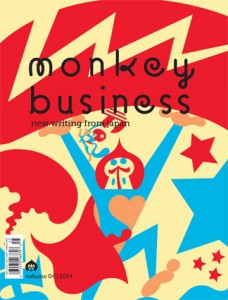
“In part, this collection is a quest. And it is a quest into questions, many of which straddle the thin lines of life, all the while hurling us through time and space, water and air, pain and pleasure, and beginnings and ends.” (A Public Space)
By Brett Rawson (Akita-ken, 2007-09) for JQ magazine. Brett is a writer, translator, and volunteer. He currently lives in New York, where he is pursuing an MFA in creative writing at The New School and is the professional development chair for the JET Alumni Association of New York. If you have job opportunities for JET alums, an interest in presenting at JETAANY’s annual Career Forum, or want to collaborate on professional endeavors, contact him at career@jetaany.org.
Meet Volume 4 of Monkey Business International: New Writings from Japan, a collection of 23 works that will take you on a wild ride through the literary landscape of Japan. In fact, it goes beyond the boundaries of Japan—as summed up by co-founders Motoyuki Shibata and Ted Goossen in the preface, Monkey Business International is “60 percent contemporary Japan, 20 percent contemporary American and British, and 20 percent modern classic Japan,” though of course not every hybrid has a categorical home.
In part, this collection is a quest. And it is a quest into questions, many of which straddle the thin lines of life, all the while hurling us through time and space, water and air, pain and pleasure, and beginnings and ends. Take for example the short story “The Man Who Turned into a Buoy” by Masatsugu Ono. The title itself seems to whisper, loosen your grip, encouraging us to suspend our disbelief and simply enjoy as our perspective gets gently nudged out of ordinary orbit.
The tale transports us to a tiny town nestled between the shoreline and the hills, which is overrun with frolicking monkeys who descend to steal food left on graves, but have been known at times to talk with villagers, and sometimes in the voice of the deceased. This town also observes the tradition of the body as a buoy—a single man tasked with the job of nakedly floating at the edge of the inlet during the day, issuing warnings to people who exit the bay. The man who turned into the buoy is the narrator’s grandfather, and his story is recounted through the grandmother in a dense dialect that is beautifully captured by translator Michael Emmerich.
JQ Magazine: Book Review – ‘Dreams of Love, Etc.’ from ‘Monkey Business Volume 3’
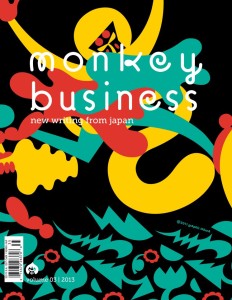
“Most striking about this piece is how astute Kawakami is in capturing not only the loneliness and boredom of daily life, but the paradox of how absurd life is and how, ultimately, it’s also really no big deal.” (A Public Space)
By Sharona Moskowitz (Fukuoka-ken, 2000-01) for JQ magazine. Sharona is interested in fresh, new voices in fiction and creative nonfiction.
In the latest issue of contemporary Japanese literature anthology Monkey Business Volume 3, Japanese novelist Mieko Kawakami writes of roses, post-earthquake malaise and a friendship that never quite consummates.
We first encounter the narrator, who inexplicably calls herself Bianca, as she stands on her porch tending to her bed of roses.
By her own admission, Bianca’s days are filled with nothing—“I don’t work. I’m not pregnant. I don’t watch TV. I don’t read books. Come to think of it, I do absolutely nothing.” What she is, however, is a wife—a loaded title for a Japanese woman with its implications of duty and decorum. Yet she wants more—much more. What exactly, she isn’t quite sure.
Stuck in the doldrums of her daily existence, she thinks and rethinks the simplest decisions, her inner monologue playing out like T.S. Eliot’s “The Love Song of J. Alfred Prufrock.” (“Shall I part my hair behind? Do I dare to eat a peach?”) What little volition she has is spent on tending to her plants, a hobby she developed after the earthquake, perhaps as an outlet for her nurturing tendencies, or, more likely, as a reminder that life was returning to normal after the shaker and its ensuing chaos.
JET alum Roland Kelts column in Time Magazine on Japan’s Identity Crisis and Right-Wing Rhetoric
********
A thought provoking article by JET alum author and writer Roland Kelts(Osaka-shi, 1998-99) from the current issue of Time Magazine.
The Identity Crisis That Lurks Behind Japan’s Right-Wing Rhetoric
Here’s a quote:
“Japan is a country whose identity has been bowdlerized, hollowed out by a dream of Western dominance that no longer exists. It may make sense to see its recent surge in nationalism as a dumbed-down version of Japanese adolescence. This is a country spun around by its own single-minded pursuit of progress, and it has no idea who it’s supposed to be today.”
Here’s a link to the full article: http://world.time.com/2013/05/31/the-identity-crisis-that-lurks-behind-japans-right-wing-rhetoric/
JET Alum Author Beat 1.20.13
Gemma Vidal (Okayama-ken, 2010-12) is a recently returned JET seeking work in product licensing and copyright (if it’s within the publishing industry, even better!). You can usually find her in her little web spaces Gem in the Rough and Peachy Keen (her JET adventures) or training with San Jose Taiko. If you know of any authors/aspiring writers you’d like to see featured in JET Alum Author Beat, just contact Gemma at gem.vidal [at] gmail.com.
- It’s less than a month until Robert Weston’s (Nara-ken, 2002-04) release of his new book, Prince Puggly of the Spiff and the Kingdom of Spud, and to mark the countdown he posted some of the artwork for the book. Victor Rivas is also behind the illustrations of Robert’s previous book, Zorgamazoo. Speaking of Zorgamazoo, it seems like we might be seeing this on the big screen! By the producers of Shrek no less! Congratulations on the film option Robert!
- What’s going on in the Japanese pop culture arena? Take a look at Roland Kelt’s (Osaka-shi, 1998-99) blog on his brief picture post on Japan’s Comiket, the mecca of all things self-published. Looking at his website made me realize that it was Hayao Miyazaki’s 72nd birthday this month. Shame on me, I know.
- Ari Kaplan, JET Alumni and author of Reinventing Professional Professional Services: Building Your Business in the Digital Marketplace, recently had his book translated into Japanese, which is under the title ハスラー プロフェッショナルたちの革新 . The translated book can be found at the publisher’s website. Here is what Ari had to say about his book being translated:
The publication of the Japanese edition offered me the opportunity to express my gratitude for the remarkable experience I had almost two decades ago. I dedicated this version to the Hyogo Prefectural Board of Education, Kobe Kohoku High School (where I taught), and the head of the English department at my school, among others.
Until next time JET alumni!
JET Alum Author Beat 12.15.12
Gemma Vidal (Okayama-ken, 2010-12) is a recently returned JET seeking work in licensing/merchandising (if it’s within the publishing industry, even better!). You can usually find her in her little web spaces Gem in the Rough and Peachy Keen (her JET adventures) or training with San Jose Taiko. If you know of any authors/aspiring writers you’d like to see featured in JET Alum Author Beat, just contact Gemma at gem.vidal [at] gmail.com. She would also like to express her deepest condolences to the community of Newtown, Connecticut.
- Roland Kelts (Osaka-shi, 1998-99), author of Japanamerica wrote a special article for The Japan Times where he interviewed Pete Townshend, guitarist of The Who and discussed UK/Japan post-WWII similarities and Mr. Townshend’s recent memoir, “Who I Am”. You can find the article here. Roland Kelts also posted an interesting article on the possible decline of the pop culture phenomenon “Japan Cool”. That article can be found here at The Christian Science Monitor.
- If you’re looking for some light entertainment, Young Adult book Guardian of the Dead’s New Zealand author Karen Healey self-published a collection of essays titled Teen Movie Times. In this collection she muses on teen movie “classics” such as Bring it On and Clueless. Who knows, maybe one of these movies can be used in one of your lessons?
JQ Magazine: Book Review – Haruki Murakami’s ‘1Q84’
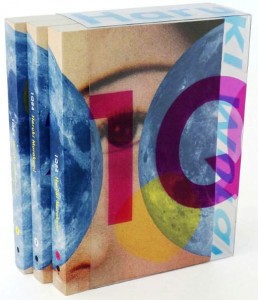
“Murakami’s previous books were like delicious sandwiches that left you wanting more. 1Q84 is like a two-foot long sub that filled you to bursting, but you’re still not totally satisfied.” (Vintage International)
Roland Kelts, don’t kick me in the balls—
One man’s attempt to review a book honestly while still keeping friends
By Rick Ambrosio (Ibaraki-ken, 2006-08) for JQ magazine. A staple of the JET Alumni Association of New York (JETAANY) community, Rick manages their Twitter page and is an up-for-anything writer.
My girlfriend wouldn’t shut up about it.
“1Q84 is the best! Ah, when it comes out in English you need to read it!” Just talking about it made her rush to find her old copies (it was broken up into three books in Japan) and start reading them again. She was enthralled, to say the least. I’ve been a Murakami fan for a while: Norwegian Wood was emotional and sexually riveting; Dance Dance Dance was creepy as hell but lots of fun; Kafka on the Shore blew my mind. So I was hungry for 1Q84.
I picked it up shortly after it came out…and put it down for a while…then picked it up again…then down… then up…I think you get the idea. My feelings can kind of be summed up like this: Murakami’s previous books were like delicious sandwiches that left you wanting more. 1Q84 is like a two-foot long sub that filled you to bursting, but you’re still not totally satisfied.
The plot follows two people tied together by fate, love, and inter-dimensional happenstance. Tengo is an author and math teacher who finds himself embroiled in a shady plot to write an award-winning book. Aomame is a fitness instructor with a decidedly darker side job. Both find themselves in an altered version of 1984 called 1Q84 that deviates from the previous reality in specific ways. Those changes seem to revolve around a cult, a beautiful young girl, a book and mysterious “Little People.” Their battle to beat the odds and find each other, discover where they are, and who’s behind the changed world is an epic journey told through alternating perspectives.
1Q84 had all the things I love about Murakami: Super complex, interesting and engaging characters, crazy inter-dimensional sex, lots of mystery, and supernatural elements that bring it right on the cusp of reality, teetering between a fantasy realm and the real 1984. His ability to walk that line (like a cat walking a picket fence for those who love cats not only in Murakami novels, but also in reviews of Murakami novels) is astounding and he does it…for a really long time.
Gemma Vidal (Okayama-ken, 2010-12) is a recently returned JET seeking work in licensing/merchandising (if it’s within the publishing industry, even better!). You can usually find her in her little web spaces Gem in the Rough and Peachy Keen (her JET adventures) or training with San Jose Taiko. If you know of any authors/aspiring writers you’d like to see featured in JET Alum Author Beat, just contact Gemma at gem.vidal [at] gmail.com
- Congratulations are in order to Will Ferguson (Nagasaki-ken, 1991-94), author of Hitching Rides With the Buddha (f/k/a The Hitchhiker’s Guide to Japan), who was awarded the esteemed 2012 Scotiabank Giller Prize for his novel 419. You can check out the announcement on the Scotiabank Giller Prize website and read more about his novel and other works on Will’s own website. Congratulations again, Will!
- What better way to warm up from the cold weather than a cup of sake! If you’re a fan of sake and live in Japan, check out John Gauntner’s (author of The Sake Handbook) annual Sake Professional Course 2013. It is a 5-day educational course which includes classroom sessions and visiting sake breweries in the Osaka/Kyoto/Kobe area. For more information about the schedule and registration, please visit the SPCJapan website. You can also download a free version of Sake: The Least You Need To Know, a quick start guide to sake here
- Suzanne Kamata (Tokushima-ken, 1998-90), author of Losing Kei and fiction editor of Literary Mama announced that her latest Young Adult novel, Gadget Girl: The Art of Being Invisible will be published by GemmaMedia (cool name) in May 2013! Gadget Girl follows the life of 14-year old Aiko Cassidy and her dream to become a manga artist. The story won the SCBWI Magazine Merit Award in Fiction. You can check out the book on her website or through Amazon, Powells, and Indiebound.
- Japanamerica’s Roland Kelts (Osaka-shi, 1998-99) will lead a presentation titled, “Japan’s New Anti-Piracy Law and the Online Media Debate” with media lawyer David B. Hoppe and music journalist Steve McClure on November 14th.
- Attention NY residents! James Kennedy (Nara-ken, 2004-06), author of The Order of Odd-Fish is holding a signing on November 27th at the Pittsford Barnes & Noble in Rochester at 7PM and presenting new material on November 28th at Writers and Books (also in Rochester with a $5 fee). Details can be found on James’ website and this site for the November 28th event. Go and show your support!
- Want a chance to win a free book written by one of our own? Benjamin Martin (Okinawa-ken, 2008-Present), publisher of the More Things Japanese blog is giving away two personalized copies of his new book, Samurai Awakenings which was just released last month! The giveaway ends on November 30th, so go to Goodreads and sign up! You can read JETwit’s own brief interview with Benjamin about his book.
- Mie-ken JET alumni Laura Popp’s fantasy novel, Treasure Traitor is out! Here’s the summary on Amazon’s website to give you a taste of the story:
“In a universe torn by war, two governments vie for power: the elemental Kingdom and the telepathic Hierarchy. Hierarchy women with animal bonds think nothing of sacrificing their beasts’ lives to protect themselves. Except sixteen-year-old Renagada. The bond with her carrion-eater bird Acha is two-sided, and she knows his mind as much as he knows hers. When Rena overhears her parents plotting to kill Acha because of superstition, she must leave her fiancé and home of sheltered luxury to flee with Acha into the desert. Peril awaits them at every turn, and someone is tracking them…”
And that’s all for this round of the Author Beat!
Roland Kelts Praises the Who’s Pete Townshend in ‘The New Yorker’

Roland Kelts, left: “When I published my first book, Japanamerica, about the odd synchronicity between two societies, Japanese and American, at once at great odds and suddenly allies, my publisher asked me to send the book to Pete Townshend. He had asked for it, why not give it to him?”
Courtesy of JETAA Northern California’s Mark Frey (Kumamoto-ken, 2002-06):
In a new article by JET alum Roland Kelts (Osaka-shi, 1998-99) on Pete Townshend in The New Yorker, Kelts references his book Japanamerica—of which Townshend said “I love that book!” to JQ magazine editor Justin Tedaldi at an NYC signing yesterday for his new memoir Who I Am—at the end of the article and offers some thoughts contrasting the experience of artists in the U.K. and Japan after World War II.
I first met Pete Townshend fifteen years ago in a modest London hotel suite. I was there with my friend Larry David Smith to interview Townshend for Smith’s book, “The Minstrel’s Dilemma.” We were already seated inside when I looked out the first-floor window and saw Townshend pulling into the parking lot.
He arrived alone, sans entourage or fanfare, driving himself in a gray Mercedes station wagon. Minutes later, the knob on the suite door rattled and shook. I stood, thinking that it might be a member of the hotel staff and wondering if I should turn the knob from our side. There was a pause, then more rattling, then the door swung open and Townshend burst through, eyes wide with exertion. He had apparently been trying to pull when he should have pushed.
We were scheduled to meet for two hours, but Townshend was unstoppable, regaling us not with stories of rock debauchery, but a stream of complex, sometimes half-formed ideas about popular culture, history, and human psychology. We were told not to ask him about his failing marriage; he immediately addressed it, confessing to a jolt of sadness while shaving that morning. “Don’t mention Keith Moon,” wrote his personal assistant via fax. “I never properly mourned for Keith,” he soon said, unprompted, and through tears.
For the complete story, click here.
JQ Magazine: Book Review – ‘Monkey Business Volume 2’
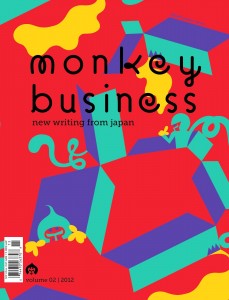
“Anyone can read this book and appreciate it. It provides a window into the heart, mind, and soul of the Japanese people following the tsunami, earthquake and nuclear disaster.” (A Public Space)
By Greg Anderson, (Fukuoka-ken, 1990-1992) for JQ magazine. Greg is part of the fourth class of the JET Program, which began in 1987. He is currently employed as an auditor with the U.S. Treasury Department and is a new member of the JETAA New York book club.
Monkey Business: New Writing from Japan is an anthology of opinions, thoughts, and stories written by some of the most prominent writers from the past and present on the subject of Japan and co-edited by Japanamerica author Roland Kelts (Osaka-shi, 1998-99). I love this book!
Why? Because anyone can read this book and appreciate it. You do not have to be an aficionado of Japan or, frankly, be able to locate it on a map. This book provides a window into the heart, mind, and soul of the Japanese people following the tsunami, earthquake and nuclear disaster. Just as in the United States following the events of September 11, 2001, Americans were forced to pause and consider American values, the American way of life and America’s relationship with rest of the world, along with what it means to be an American.
The events of March 11, 2011 were a watershed moment for the people of Japan. Nothing will ever be as it once was in Japan. The loss of life, failed technology, and deceit/lies are themes that are all addressed in this issue of Monkey Business, released earlier this year. What’s great about this book is that there are two ways that it can be read: You can read it chronologically from page one through page 210, you can browse the index to find an interesting story, or you can simply thumb through the book (like I did), find a story that strikes your fancy, and begin reading (I assure you that you will not be disappointed).

